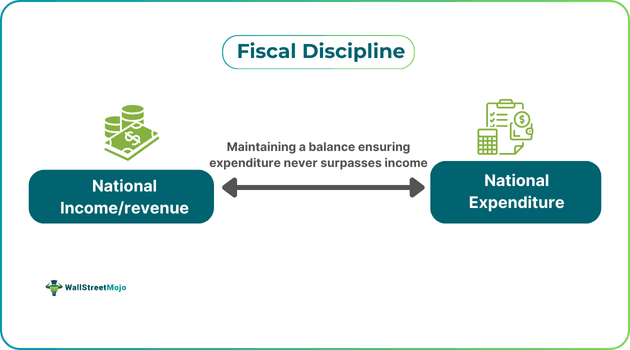Table of Contents
Fiscal Discipline Meaning
Fiscal Discipline is the ability of any government to balance its income and expenditures. Whether a country is small or well-developed, maintaining financial discipline is a must, as it influences the underlying economy, monetary health, and financial stability. In short, adopting these practices and conforming to the related regulations boosts an economy’s confidence and also encourages its macroeconomic performance.

Without fiscal discipline, there will be no proper record of the government's cash flow, sources of revenue, and expenditures. This can lead to huge financial loss and uncontrolled borrowing, making it a long-term burden for any nation. Financial discipline depends on any government's capacity to balance stable monetary operations and fiscal conditions throughout time.
Key Takeaways
- Fiscal discipline refers to the practices that help maintain a balance between the government's income and its expenditures.
- Lack of such discipline results in government spending surpassing government income, which either leads to heavy borrowing or financial failure of an economy.
- It is essential for every nation, be it small, developing, or developed countries, to regulate its capacity to balance fiscal conditions and practice stable monetary operations over time.
- Fiscal discipline allows governments to become independent and gain control of their monetary operations, financial markets, international trade, and overall economic growth over time.
Fiscal Discipline Explained
Fiscal discipline is all about maintaining a balance between a nation's income and expenses to ensure a smooth economy with timely growth and significant economic performance. If this discipline is not maintained, government spending might surpass income, hampering the economy's financial stability.
In such a situation, the government will have no option but to borrow money from different sources, such as world organizations and other developed nations, or suffer a financial deficit. This, in turn, will directly impact the nation in the form of currency depreciation, inducing inflation in the economy.
Fiscal discipline is essential for both developing and developed countries. It helps them resist the short-term needs of tax cuts or any extra unplanned expenditures, eventually reducing fiscal stress. The term elaborates on not only the right use of income but also the importance of planned expenditures.
When dealing with nations' budgets, there are billions of dollars involved, and any unplanned or extra expenditure can cause the nation to fall into a debt trap. With time, every nation has to practice such discipline - the earlier, the better. Adopting the required practices to maintain fiscal discipline in budget guides nations through optimal use of funds. At the same time, the lack of it can be a significant reason behind the stagnant growth and progress of many developing countries.
Examples
Below are two distinct instances to help us understand what is fiscal discipline better:
Example #1
Suppose Zanh, a fictional country, has its revenue, but the ministers lack vision and planning. As a result, there is no proper budgetary management from the government's side. For consecutive years, the expenditure of the country surpassed its income, leading to higher interest rates, currency depreciation, and high inflation in its economy. At the same time, the country, to manage its monetary operations, had to borrow funds from different countries and world organizations such as the International Monetary Fund (IMF), World Bank, and so on.
As a result, the country failed to strike a balance between its income and expenditure, which resulted in excessive debt, poverty, and a lack of trade and business opportunities. This simple example shows how the lack of financial discipline can ruin an entire economy, its resources, and overall monetary growth.
Example #2
Turkey's Treasury and Finance Minister, Mehmet Simsek, assured investors that the government would commit to tight fiscal discipline. He addressed the topic during a September 2024 meeting in New York hosted by Goldman Sachs and the Türkiye-US Business Council. Simsek, along with trade minister Omer Bolat, attended the session and emphasized the efforts to curb the shadow economy, paving the path toward disinflation.
Simsek also confirmed that no new taxes are being planned currently, and the government's focus is on adopting practices to lower inflation. Turkey's benchmark interest rate has been held at 50% for the last six months, but to tackle inflation, it has peaked at 75%. The finance minister noted that the delayed impact of these monetary policies and a disciplined fiscal approach are primary drivers of disinflation. The finance minister also dismissed the concerns that fiscal tightening would become a problem in growth and mentioned the renewed interest of foreign investors in Turkish assets.
Importance
Complying with fiscal discipline not only helps governments have records readily available to check the expenditures against revenue but also helps them track the progress and compare their economic growth from time to time. Some of the points covering the importance of maintaining this discipline are as follows:
- Helps in maintaining macroeconomic stability.
- Strikes a balance between national income and expenditure.
- Ensures smooth functioning of the economy.
- Assists in improving the aggregate economic performance of the nation.
- Helps a government reduce its economic vulnerabilities.
- Keeps a regular check on the government's revenue and cash flow.
